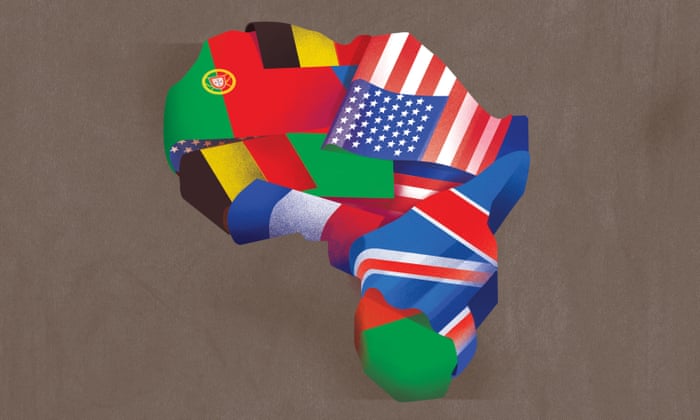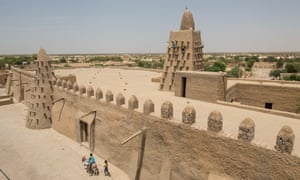
One of the greatest ironies in the history of the collapse of any civilisation must be the initial interaction between Africans and Europeans. The Igbos in the east of Nigeria, for instance, initially saw the Europeans as madmen of strange appearance and ill-formed ideologies. On banking, the Igbos wondered how an adult in his right mind could hand over his possessions for others to keep for him. By the end of the 19th century, the “madman” had overturned their civilisation, and they had adopted his.
The irony is especially relevant in these times when, given the relative failures of most former western colonies, there have been renewed calls for recolonialisation. In September, American professor Bruce Gilley wrote an essay arguing for a recolonialisation of some states, replicating colonial governance of the past “as far as possible” and even building new colonies from scratch.
If the very foundations of his arguments are flawed, it is because he, like most people today, has come to accept that the only metric for measuring modernity is through the western lens. This is the heart of the problem.
Colonialism across most of Africa was so thorough – especially among the former British protectorates – that in its aftermath Africa was essentially hollowed out. The civilisations of the peoples, their various cultures and traditions, their religions, political philosophies and institutions, were eroded or even destroyed.
Today most of the nations in Africa should not even be called African nations, but western African nations. The language, political ideology, socio-economic structures, education, and everything that makes up a nation, even down to popular culture, do not originate from within these countries. African nations have a total dependency on foreign political philosophies and ideas, and their shifts and movements.
It is the feeblest position a state and its people can be in, because it is a position of chronic subservience. It also means that whatever becomes normalised in the west will eventually be adopted in, say, Uganda or Togo.
This has resulted in Africa being slowly emptied of its essence, and becoming a relic, no different in substance from a statue or a museum.
Celebrations of Africa on the international scene mostly involve dancing, music, traditional fashion and other cultural artefacts – hardly ever showcasing African-originated economic ideas, social ideologies or intellectual theories. It is not that these do not exist, but the world has successfully convinced everyone – including Africans themselves – that everything African is inferior.
Central to this psychology is the proliferation of Africans being educated in the west. This trend has resulted in the rise of an army of western-influenced elites who continue the colonialism of their own people.
Imagine what can happen when an African nation with a high unemployment rate imbibes a gun culture. Consider the potential danger of a situation in Nigeria, where the Hausa man insists his culture is being appropriated by the Yoruba. Or the Christian Igbo embracing their identity, recruiting allies, and ostracising anyone who will not acquiesce with their cause.
But this is becoming Africa’s reality. Increasingly, our elites tell us that the way of the west is “modern” and “civilised”, echoing the early colonialists who dismissed our civilisations as “barbaric”, “archaic”, and “uncivilised” to install theirs. They tell us that our institutions are corrupt, that our societies are patriarchal, and that the African traditional religions are heathenish. As western supremacy entrenches itself in our psyche, we are developing a complex that embraces western ideas without considering whether or not they are compatible with our own political, social, economic and cultural system.
Although Americans may be rightly calling for “diversity”, given a history that excluded a major demographic population of black people, Nigeria’s struggle from inception has been how to unify its enormous diversity. It was the lack of that unity that resulted in the civil war of the late 1960s. This is the same for Angola, Rwanda and Uganda, to name just a few.
But this is of little concern to Africa’s elites. What matters is to find what the political currency is in the US or Europe, and to uncritically follow it. Whereas people in the west are de-emphasising patriotism and nationalism, Africans need these to build sustainable nations.

‘The most viable pathway would be for Africa’s elite to look within the vast political and ideological resources on which successful civilisations were built.’ Timbuktu in Mali. Photograph: Sean Smith for the Guardian
In fact, the lack of them, in favour of ethnic allegiance, has been the bane of most African nations, from Congo to Somalia: the result of the Berlin Conference of 1884, in which European leaders divvied up African territories among themselves, ignoring traditional ethnic borders.
In making a case about east Asia and citing the success of Singapore, Taiwan, Hong Kong and others, Chinese philosopher Zou Shipeng argued that the west’s claim to its culture as the only pathway to modernity creates unfair hegemony. Is it possible, he asked, to achieve modernity solely through Chinese culture?
The Middle Eastern nations are another example of cultures that have accepted material modernity but have not been westernised ideologically. They have retained their political systems which, given their theocratic cultural framework, seem best suited for these countries. Every time western nations have tried to disrupt those systems and install a western-style democracy, it has failed.
This was also the case with the first two centuries of European contact with west Africans. The Portuguese and the Dutch traded with many west African tribes from the mid-15th century without colonising them. For 200 years, the Igbos had “Dane guns”, mirrors, and gins, among others, but held on to their own traditions and cultures. It could therefore be argued that the “modernism” orchestrated by western colonialism, isn’t organic to the Africans. Yet proponents of recolonialisation and the African elites fail to see this.
With the sudden unexpected rise in rightwing populism across the west, it is challenging to decide what a viable future may look like. One would think African nations would take this opportunity to think for themselves, to come up with unique African systems.
However, rather than do this, the African elite class largely insists that Africa is not western enough, and is trying to drag the continent, still grappling with western modernism, into the west’s evolving postmodernist regime.
The most viable pathway would be for Africa’s elite to look within the vast political and ideological resources on which successful civilisations (the Zulu, the Igbo, the Malian dynasties of Timbuktu, the Oyo empire, etc) were built. In most Igbo states, for instance, there was an egalitarian system where an older member of a clan represented his people in the elders’ council. There were no kings or presidents. Perhaps there could be a way to adapt this unique political structure to replace the western one which has so far failed.
We need to look into these systems and extract coherent policies that can help form workable and uniquely African social and political systems. This is the only viable path to preventing the continent from fully becoming western Africa – and the only way to ending the continent’s long-term political decay.
In making a case about east Asia and citing the success of Singapore, Taiwan, Hong Kong and others, Chinese philosopher Zou Shipeng argued that the west’s claim to its culture as the only pathway to modernity creates unfair hegemony. Is it possible, he asked, to achieve modernity solely through Chinese culture?
The Middle Eastern nations are another example of cultures that have accepted material modernity but have not been westernised ideologically. They have retained their political systems which, given their theocratic cultural framework, seem best suited for these countries. Every time western nations have tried to disrupt those systems and install a western-style democracy, it has failed.
This was also the case with the first two centuries of European contact with west Africans. The Portuguese and the Dutch traded with many west African tribes from the mid-15th century without colonising them. For 200 years, the Igbos had “Dane guns”, mirrors, and gins, among others, but held on to their own traditions and cultures. It could therefore be argued that the “modernism” orchestrated by western colonialism, isn’t organic to the Africans. Yet proponents of recolonialisation and the African elites fail to see this.
With the sudden unexpected rise in rightwing populism across the west, it is challenging to decide what a viable future may look like. One would think African nations would take this opportunity to think for themselves, to come up with unique African systems.
However, rather than do this, the African elite class largely insists that Africa is not western enough, and is trying to drag the continent, still grappling with western modernism, into the west’s evolving postmodernist regime.
The most viable pathway would be for Africa’s elite to look within the vast political and ideological resources on which successful civilisations (the Zulu, the Igbo, the Malian dynasties of Timbuktu, the Oyo empire, etc) were built. In most Igbo states, for instance, there was an egalitarian system where an older member of a clan represented his people in the elders’ council. There were no kings or presidents. Perhaps there could be a way to adapt this unique political structure to replace the western one which has so far failed.
We need to look into these systems and extract coherent policies that can help form workable and uniquely African social and political systems. This is the only viable path to preventing the continent from fully becoming western Africa – and the only way to ending the continent’s long-term political decay.